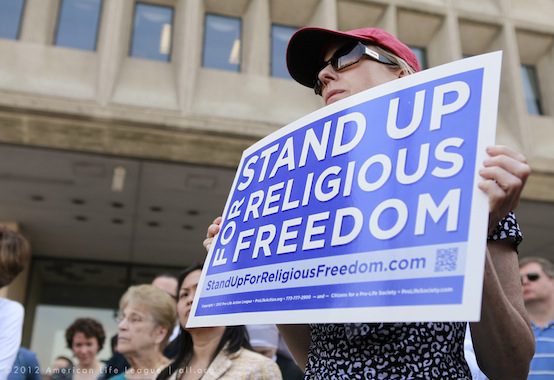Is Religious Freedom Possible?

In a post for The Immanent Frame responding to the Hobby Lobby and Wheaton College decisions, Indiana University professor Winnifred Fallers Sullivan challenges the idea of religious freedom on which those decisions are based. Although a liberal, Sullivan does not deny that private firms and religious colleges are engaged in a kind of religious practice. Rather, she argues that because religion means different things to different people, it’s impossible to systematically distinguish legitimate “religious freedom” from mere rejection of the law:
The need to delimit what counts as protected religion is a need that is, of course, inherent in any legal regime that purports to protect all sincere religious persons, while insisting on the legal system’s right to deny that protection to those it deems uncivilized, or insufficiently liberal, whether they be polygamist Mormons, Native American peyote users, or conservative Christians with a gendered theology and politics. Such distinctions cannot be made on any principled basis…Both the majority and dissenting Justices in these two cases affirm—over and over again—a commitment to religious liberty and to the accommodation of sincere religious objections. Where they disagree is on what counts as an exercise of religion. Their common refusal, together with that of their predecessors, to acknowledge the impossibility of fairly delimiting what counts as religion has produced a thicket of circumlocutions and fictions that cannot, when all is said and done, obscure the absence of any compelling logic to support the laws that purport to protect religious freedom today.
The whole post rewards careful reading. One issue that Sullivan leaves unexamined is what counts as a “principled basis”. I take it that she means a non-historical, more or less universal definition, which would make it possible to distinguish religion from non-religion in a logically consistent way. And she’s right that no such definition exists. To mention only one example, the state cult of the Romans had little in common with what we understand by “religion” today.
But why should American law be based on universal principles that can be applied in a quasi-Kantian manner? A considerable historical literature suggests that the religion clauses of the Constitution emerged from the historical experience of Anglo-Protestantism. They were developed and applied in a society that was assumed to be overwhelmingly Christian and organized, for the most part, into recognizable denominations. Of course, there were always communities whose religion was inconsistent with these assumptions. But it was assumed that they would either be demographically marginal, or identifiable under Christian theological categories.
The problem, of course, is that this world no longer exists. And not only because of secularization or immigration by Catholics, Jews, and more recently Muslims. As Sullivan observes, the American brand of evangelicalism encourages individuals to decide for themselves what religion means to an historically unprecedented degree. So we face the challenge of applying historically and theologically specific concepts of religion, liberty, and so on in a way that obscures their limits and contingency. Thus the knots into which both sides of the Court have had to twist their arguments not only in Hobby Lobby, but also in cases such as Kiryas Joel Village School District v. Grumet.
There’s no obvious solution to this problem. We can neither revive Anglo-Protestant categories in a pluralistic society, nor can we formulate a definition of religion that will satisfy everyone. My own preference is for giving as much deference as possible, consistent with public order, to congregations, non-profit institutions, and yes, private firms, to act in ways that reflect their beliefs about what they owe to God and the world. But that means giving up the dream of cultural hegemony that today inspire the secular Left at least as strongly as it once did the religious Right.
(h/t Samuel Moyn, via Facebook).
Comments